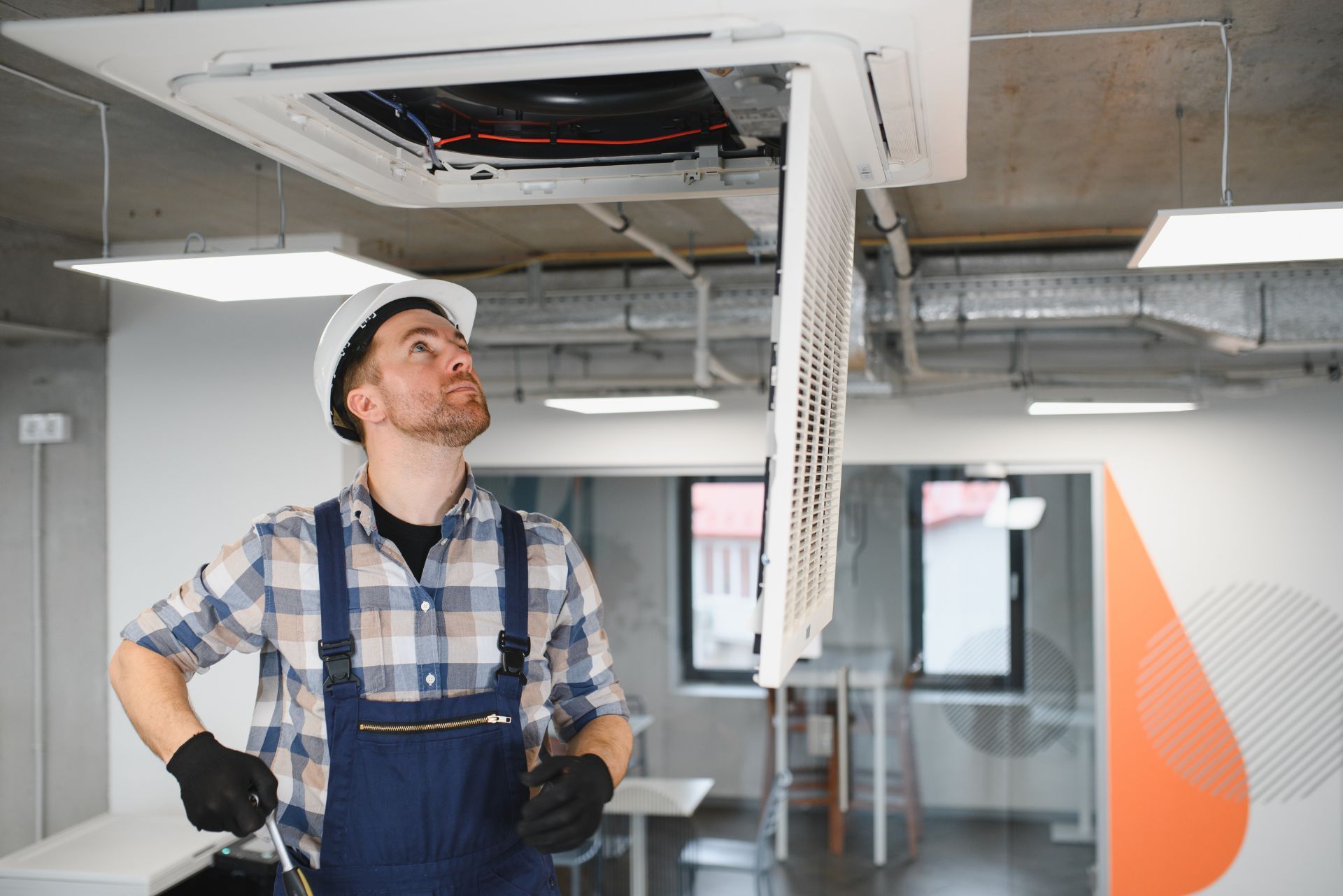Top 3 Recommended Policies

Tennessee’s HVAC contractors handle everything from humid summers to cold winter mornings, keeping homes and businesses comfortable across the state. But every project carries its own risks, from property damage to employee injuries and liability claims. Having the right insurance coverage is essential to protect your business, your team, and the customers who rely on your services. This guide explains how HVAC contractor insurance in Tennessee works, the policies that matter most, and what factors influence costs. With a highly regulated insurance market and strong competition among contractors, staying compliant and well-covered gives your business an edge. Whether you are new to the trade or managing an established company, understanding your insurance options will help you operate with confidence and security.
Understanding the Core Insurance Types for HVAC Contractors
HVAC contractors face a unique set of risks, from on-site injuries to potential property damage during installations or repairs. To mitigate these risks, several types of insurance are typically recommended or required.
General Liability Insurance
General liability insurance is arguably the most critical coverage for HVAC contractors. It protects against claims of bodily injury or property damage resulting from your work. For example, if a customer’s property is accidentally damaged during an HVAC installation, this insurance can cover repair costs and legal fees.
In Tennessee, the average general liability insurance premium for HVAC businesses with around $150,000 in annual revenue is approximately $3,140. Interestingly, this cost can be reduced by up to 73% by shopping around and comparing quotes, emphasizing the value of competitive insurance shopping.
Given the financial protection it offers, general liability insurance is often a prerequisite for contractors seeking to win contracts or maintain licensing compliance. Furthermore, many clients require proof of this coverage before awarding contracts, making it not just a safety net but also a business necessity in a competitive market.
Workers’ Compensation Insurance
Workers’ compensation insurance is mandatory for most HVAC businesses in Tennessee, especially those with employees. It covers medical expenses and lost wages if a worker is injured on the job. The typical cost for workers’ compensation insurance in Tennessee is about $2,976 per $100,000 in payroll, reflecting the inherent risks of HVAC work, which often involves heavy equipment and potentially hazardous environments.
Having this coverage not only protects employees but also shields contractors from lawsuits related to workplace injuries. It’s a critical component of responsible business management and legal compliance. Moreover, maintaining a safe work environment can lead to lower insurance premiums over time, as fewer claims can result in better risk assessments from insurers.
Additional Coverage Options
While general liability and workers’ compensation are foundational, some HVAC contractors may also consider other insurance types such as commercial auto insurance, equipment coverage, and professional liability insurance. These policies can provide further protection tailored to specific business needs.
Commercial auto insurance is particularly important for HVAC contractors who rely on vehicles to transport tools and equipment to job sites. This coverage protects against damages resulting from accidents involving company vehicles, ensuring that both the contractor and their employees are safeguarded while on the road. Additionally, equipment coverage is crucial for protecting expensive tools and machinery from theft or damage, which can be a significant financial burden if not insured. Professional liability insurance, on the other hand, offers protection against claims of negligence or failure to deliver services as promised, adding another layer of security for contractors who provide design or consulting services in conjunction with their HVAC installations.

How Much Does HVAC Insurance Cost in Tennessee?
Insurance costs for HVAC contractors vary depending on several factors, including business size, revenue, coverage limits, and claims history. Understanding these costs helps contractors budget effectively and avoid surprises. Additionally, regional factors, such as local regulations and the prevalence of HVAC-related incidents, can also influence the overall cost of insurance in Tennessee. As contractors navigate the complexities of insurance, being informed about these variables can empower them to make better financial decisions for their businesses.
Premiums Based on Revenue and Payroll
As mentioned, general liability premiums for HVAC companies with $150,000 in annual revenue average around $3,140. This figure can fluctuate depending on the insurer and the contractor’s risk profile. Similarly, workers’ compensation premiums are calculated based on payroll, with the average cost being $2,976 per $100,000 in payroll for Tennessee HVAC contractors. It's important to note that these costs can vary significantly based on the specific services offered by the contractor, such as installation, maintenance, or emergency repairs, which may carry different risk levels.
Industry analysis indicates that HVAC liability insurance typically ranges from 1.3% to 2.6% of annual gross revenue. This range reflects the specialized risks associated with HVAC work, such as handling refrigerants, electrical components, and working in confined spaces. Moreover, factors like the contractor's experience level, the types of equipment used, and the safety measures implemented can also play a crucial role in determining the final premium. Contractors who invest in advanced training and adhere to stringent safety protocols may find themselves in a better position to negotiate lower rates.
Tips to Reduce Insurance Costs
Contractors can lower their insurance premiums by maintaining a clean claims history, investing in safety training, and shopping around for competitive quotes. Since premiums can be reduced by up to 73% through competitive shopping, it pays to compare policies and work with brokers who understand the HVAC industry. Additionally, bundling different types of insurance, such as general liability and commercial auto insurance, can lead to significant discounts. Many insurers offer incentives for businesses that implement risk management strategies, such as regular safety audits or employee training programs, which can further contribute to lowering overall insurance costs.
Furthermore, HVAC contractors should consider joining industry associations or groups that provide access to group insurance plans. These plans often come with reduced rates due to the collective bargaining power of the group. By leveraging such resources, contractors not only save on insurance costs but also gain valuable insights and networking opportunities within the HVAC community. Staying informed about changes in regulations and industry standards can also help contractors adapt their insurance needs accordingly, ensuring they remain adequately covered without overpaying.
Why Insurance Verification Matters for Tennessee Homeowners
Homeowners hiring HVAC contractors should prioritize verifying insurance coverage to protect themselves from potential fraud and liability issues. In 2024, the Tennessee Board for Licensing Contractors issued over $900,000 in civil penalties related to home improvement fraud, underscoring the importance of due diligence.
How Homeowners Find HVAC Contractors
A recent survey revealed that 67% of homeowners find their HVAC contractors through word of mouth or recommendations, including social media referrals. While personal recommendations are valuable, verifying a contractor’s license and insurance status remains essential to avoid scams or subpar work.
The Tennessee Department of Commerce & Insurance advises consumers to always check a contractor’s licensing and insurance before hiring. This simple step can prevent costly mistakes and ensure the contractor is qualified and properly insured.
In addition to checking for insurance, homeowners should also consider asking for references from past clients. A reputable contractor should be willing to provide testimonials or contact information for previous customers who can speak to the quality of their work. This not only gives homeowners a better understanding of what to expect but also helps to build trust in the contractor's capabilities. Furthermore, reviewing online ratings and feedback on platforms such as Yelp or Angie's List can provide additional insights into a contractor's reliability and professionalism.
For homeowners interested in learning more about avoiding home improvement fraud, the Tennessee Department of Commerce & Insurance’s consumer tips offer practical guidance. Additionally, attending local home improvement expos or workshops can be beneficial. These events often feature licensed contractors who can showcase their work and provide homeowners with valuable information on what to look for when hiring professionals. Engaging with contractors in person allows homeowners to ask questions and gauge their expertise, further ensuring a safe and satisfactory hiring process.

Regulatory Environment and Industry Trends in Tennessee
Tennessee’s insurance and contracting industries have seen significant growth and regulatory activity in recent years. With nearly 294,000 licensed insurance professionals as of mid-2022, the state’s market is both competitive and well-regulated. This growth can be attributed to various factors, including a booming economy, population growth, and an increasing demand for skilled tradespeople in the construction and HVAC sectors.
Licensing and Compliance
HVAC contractors must comply with state licensing requirements, which include demonstrating proof of insurance. This ensures that contractors operating in Tennessee meet minimum standards for professionalism and financial responsibility. Additionally, contractors are often required to complete continuing education courses to keep their licenses current, which helps them stay informed about the latest technologies and industry best practices.
Regular enforcement actions, such as the civil penalties issued for home improvement fraud, highlight Tennessee’s commitment to protecting consumers and maintaining industry integrity. The state has also implemented various training programs aimed at educating both contractors and consumers about their rights and responsibilities, further promoting a transparent and trustworthy marketplace.
Market Outlook
The robust growth in Tennessee’s insurance sector suggests that HVAC contractors have access to a wide range of insurance products tailored to their needs. This competitive environment benefits contractors by providing options that can be customized for cost and coverage. Furthermore, as the state continues to invest in infrastructure and energy efficiency initiatives, HVAC contractors are likely to see increased demand for their services, particularly in energy-efficient installations and retrofitting projects.
Moreover, the rise of smart home technology and the growing emphasis on sustainability are influencing market trends. Contractors who adapt to these changes by incorporating advanced systems and eco-friendly practices into their offerings may find themselves at a competitive advantage. As consumers become more environmentally conscious, the demand for innovative HVAC solutions that reduce energy consumption and enhance indoor air quality is expected to rise, further shaping the landscape of the industry in Tennessee.
Final Thoughts: Protecting Your HVAC Business and Customers
For HVAC contractors in Tennessee, insurance is more than just a regulatory checkbox—it’s a cornerstone of a sustainable business. Proper coverage protects against financial loss, builds customer trust, and ensures compliance with state laws.
Contractors should prioritize obtaining general liability and workers’ compensation insurance, understand their premium costs, and regularly review their policies to adapt to changing business needs. Meanwhile, homeowners should always verify contractor insurance to safeguard their investments. This verification process not only protects the homeowner but also elevates the standards within the industry, encouraging contractors to maintain high levels of professionalism and accountability.
Furthermore, it’s essential for HVAC contractors to stay updated on the latest industry trends and regulatory changes that could impact their insurance needs. For instance, advancements in technology, such as smart HVAC systems, may require additional coverage due to the complexities involved in installation and maintenance. By being proactive in their approach to insurance, contractors can better navigate potential risks and ensure their businesses remain resilient in a competitive market.
By staying informed and proactive, HVAC professionals and consumers alike can foster a safer, more trustworthy home improvement environment in Tennessee. This collaborative effort not only enhances the reputation of the HVAC industry but also contributes to the overall well-being of the community, as homeowners can feel secure in their investments and contractors can operate with peace of mind.
For more detailed insights into workers’ compensation costs specific to HVAC contractors,
ContractorNerd’s analysis is an excellent resource to explore. Additionally, engaging with local trade associations can provide HVAC professionals with valuable networking opportunities and access to specialized training programs, further solidifying their expertise and credibility in the field.
Contact Us
HVACInsure is fully licensed and permitted to sell contractor and commercial insurance in Tennessee.
We proudly serve clients throughout Tennessee and maintain partnerships with local Tennessee insurance carriers to ensure HVAC professionals receive compliant, affordable, and comprehensive coverage that meets project and regulatory requirements.
HVACInsure Focuses on Tennessee HVAC Contractor Insurance
Nashville – Memphis – Knoxville – Chattanooga – Clarksville – Murfreesboro – Franklin – Jackson – Johnson City – Bartlett – Hendersonville – Kingsport – Collierville – Smyrna – Cleveland – Brentwood – Spring Hill – Germantown – Columbia – La Vergne – Gallatin – Cookeville – Mount Juliet – Lebanon – Morristown
Frequently Asked Question
Common HVAC Contractor Insurance Questions in Tennessee
These FAQs address common contractor questions. As HVACInsure grows, we will update this section with real client experiences and answers.
How does Tennessee's music and hospitality industry affect my HVAC insurance?
Nashville's entertainment venues have specific needs. We cover the quick-response requirements and liability exposure of keeping tourist destinations comfortable.
What coverage do I need for Tennessee's commercial growth markets?
Nashville and Memphis are booming. We cover the liability exposure and certificate requirements of urban commercial projects.
Do I need special coverage for Tennessee's manufacturing sector?
Tennessee's automotive and manufacturing industries need HVAC support. We cover plant work and factory requirements.
What about coverage for Tennessee's varied climate?
From Memphis humidity to mountain cold, Tennessee varies. We structure coverage for your actual service territory.
How do Tennessee's licensing requirements affect my insurance?
Tennessee requires HVAC contractor licensing. We ensure your coverage meets state requirements and provide certificates for compliance.
Can I get coverage for work from Memphis to the Tri-Cities?
Absolutely. Tennessee spans 500 miles. We structure coverage that works across the state's diverse regions and markets.

Still have questions?
Can’t find the answer you’re looking for? Please chat to our friendly team!

About The Author: James Jenkins
I’m James Jenkins, Founder and CEO of HVACInsure. I work with HVAC contractors and related trades to simplify insurance and make coverage easier to understand. Every day, I help business owners secure reliable protection, issue certificates quickly, and stay compliant so their teams can keep working safely and confidently.
Recognized by National HVAC Trade Associations
These trusted organizations set best practices and standards that carriers rely on when underwriting HVAC risks.
Membership signifies adherence to HVAC industry standards and contractor best practices.


